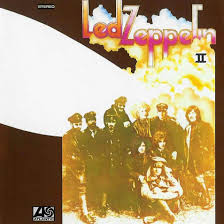What’s Jammin’: Led Zeppelin II (1969)
To be brutally, brutally honest, I was NOT cool in middle school. Not that I’m Ving Rhames now, but back then I was pretty lost having ridden the Pokémon wave a little too long and getting a little too deep into Lord Of The Rings.
I’m the oldest of four siblings and sixteen cousins, and was the youngest kid in my grade, which is a terrible combination. I desperately needed an older brother or sister to tell me I was an idiot when I wore socks up to my knees or when I put on sweat pants for the fourth day in a row. But for better or worse, I had to figure it out on my own, and honestly, I have no regrets because instead of jumping on the Good Charlotte, Blink-182 fad that filled the androgynous boyband void left behind when the Backstreet Boys called it quits, I found Led Zeppelin.
I will always remember the first time I heard Led Zeppelin II. I was on spring break with my family and life had gone from bad to worse. On top of hating everything about school, I had jumped head first into a wooden pool diving for a catch while playing beach football and my face looked like that kid from Mask.
So my dad, in his infinite wisdom, decided that the time was right for a trip to the record store. After an hour or so of perusing, we settled on The Mothership Connection by Parliament and Led Zeppelin II. I had a bad headache, probably having to do with nearly fracturing my skull, and was in a terrible mood when we put on Led Zeppelin II for the car ride back home. Yet, after the first few bars of “Whole Lotta Love,” things began looking up. Guitarist Jimmy Page starts the song with a simple, spicy guitar riff and is joined after a few bars by bassist John Paul Jones who echoes the riff perfectly with his bass line. Suddenly Robert Plant’s banshee wail breaks in and magic happens. I think I listened to that Zeppelin album three or four times that night on my Discman and would’ve listened a few more times if I hadn’t woken up my family while jumping around the room.
Led Zeppelin II was recorded sporadically across the U.K. and North America while the band toured in promotion of their first album. Despite the individual song’s variance in theme, tempo and style, the album, on the whole, is very unified. Each song has a palpable deliberateness and weight that comes from how spontaneous the recording sessions were. There are no eight or nine minute rambling, spirit-quest songs that Zeppelin later became known for with “Stairway To Heaven,” “The Rain Song” and “Kashmir.” Instead, each track ignites quickly and ends abruptly; there isn’t a single wasted second on the whole record. Another unique quality of Led Zeppelin II is the chaotic orchestration. Paradoxically, the effect of having so many instruments and vocals going at the same time actually enhances the harmony of the sound. Producer Eddie Kramer explained the effect quite simply: “Jimmy and I just flew around on a small console twiddling every knob known to man.”
It’s hard for me to be objective while discussing Led Zeppelin II. To me, the album represents freedom and redemption in a soulless, conformist society. There’s something incredibly adolescent about this music. It’s one big “EFF YOU” to everybody who doesn’t comprehend the buzz.
The way we listen to music these days is awful. People casually tap their feet to light rock stations on Pandora when they should be putting on a Zeppelin album and smashing stuff. Loosen the noose of generic, unoriginal music from around your neck and pick up this album. Thirteen-year old you will thank you for it.



